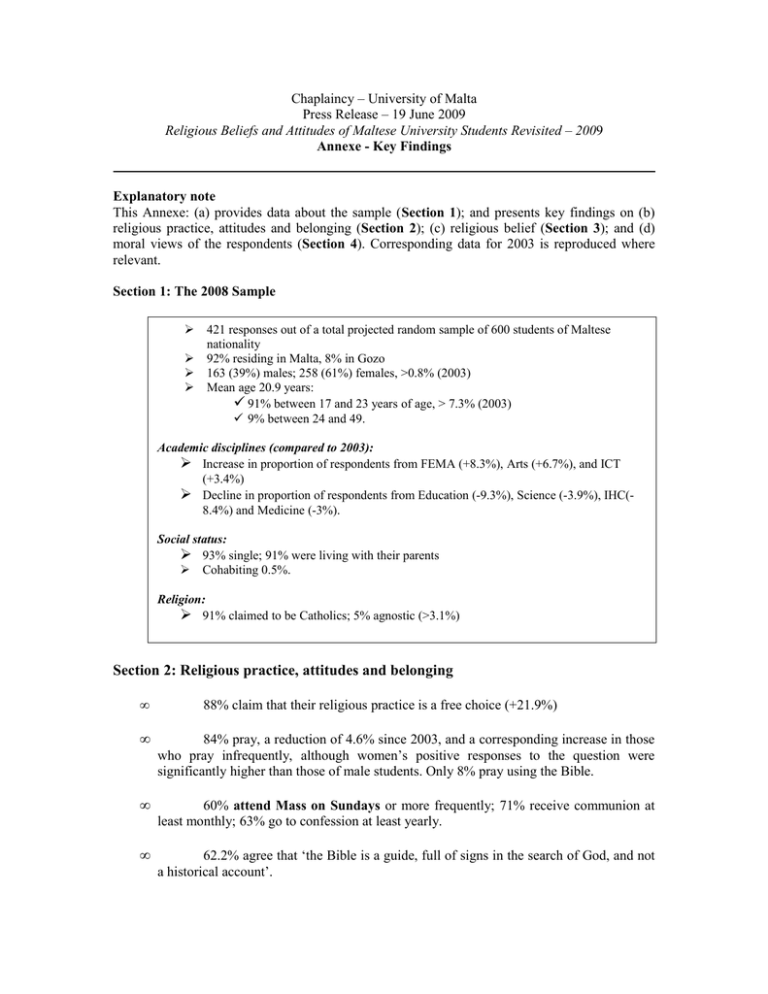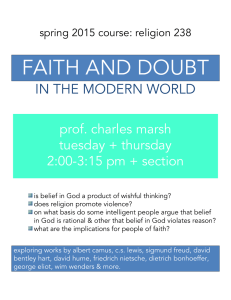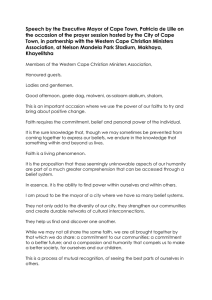Chaplaincy – University of Malta Press Release – 19 June 2009
advertisement

Chaplaincy – University of Malta Press Release – 19 June 2009 Religious Beliefs and Attitudes of Maltese University Students Revisited – 2009 Annexe - Key Findings Explanatory note This Annexe: (a) provides data about the sample (Section 1); and presents key findings on (b) religious practice, attitudes and belonging (Section 2); (c) religious belief (Section 3); and (d) moral views of the respondents (Section 4). Corresponding data for 2003 is reproduced where relevant. Section 1: The 2008 Sample 421 responses out of a total projected random sample of 600 students of Maltese nationality 92% residing in Malta, 8% in Gozo 163 (39%) males; 258 (61%) females, >0.8% (2003) Mean age 20.9 years: 91% between 17 and 23 years of age, > 7.3% (2003) 9% between 24 and 49. Academic disciplines (compared to 2003): Increase in proportion of respondents from FEMA (+8.3%), Arts (+6.7%), and ICT (+3.4%) Decline in proportion of respondents from Education (-9.3%), Science (-3.9%), IHC(8.4%) and Medicine (-3%). Social status: 93% single; 91% were living with their parents Cohabiting 0.5%. Religion: 91% claimed to be Catholics; 5% agnostic (>3.1%) Section 2: Religious practice, attitudes and belonging • 88% claim that their religious practice is a free choice (+21.9%) • 84% pray, a reduction of 4.6% since 2003, and a corresponding increase in those who pray infrequently, although women’s positive responses to the question were significantly higher than those of male students. Only 8% pray using the Bible. • 60% attend Mass on Sundays or more frequently; 71% receive communion at least monthly; 63% go to confession at least yearly. • 62.2% agree that ‘the Bible is a guide, full of signs in the search of God, and not a historical account’. • 54% disagree that ‘faith is more of a dream which turns out to be an illusion when one is confronted with the harshness of life’. • Only 32.6% agree that ‘a scientific understanding of human life and the world has made a religious understanding superfluous’. • 76.5% disagree with the view that ‘faith is an expression of a weak personality.’ • 91% of respondents want the University to provide religious services and guidance for students. • 15% are members of religious organisations; 38% are members of other organisations. Section 3 – Results of the Belief Responses 2008/2003 BELIEF (Christian) God God, the Creator of all that exists The Trinity Jesus, the Son of God The Incarnation of Jesus (God made human) The Holy Spirit Bodily Resurrection Afterlife Heaven and Hell Mary, Mother of God The Virginity of Mary, Mother of God The Church The Sacraments The Intercession of Saints Angels The Devil Existence of more than one god Energies Reincarnation Fortune Telling The Horoscope YES (%) 93.5 74.0 74.8 81.2 67.1 75.5 41.6 68.5 65.4 78.4 65.4 51.2 63.7 50.0 57.2 63.9 4.8 29.1 13.2 3.1 5.0 2003 98.0 93.5 92.8 93.8 91.1 92.0 71.7 88.1 80.9 92.3 87.2 74.6 86.3 77.2 82.1 86.1 7.8 45.0 22.9 14.7 13.1 DIFF. -4.5 -19.5 -18.0 -12.6 -24.0 -16.5 -30.1 -19.6 -15.5 -13.9 -21.8 -23.4 -22.6 -27.2 -24.9 -22.2 -3.0 -15.9 -9.6 -11.6 -8.1 In Table 3, for the first 16 topics (“God” to “Devil”), which are basic tenets of Catholic faith, the average number of positive responses is 67%, compared to the 33% of negative responses. Thus, approximately two-thirds of respondents continue to accept the basic tenets of faith, although this is substantially less than it was in 2003. For three issues, namely, belief in Bodily Resurrection, the Intercession of Saints, and Belief in the Church, the negative responses outnumber the positive ones. This could be a sign that young people on the one hand acknowledge the existence of God, but on the other hand find it difficult to relate this to an earthly existence. There is also inconsistency between lack of belief in Bodily Resurrection (42%) and belief in the Afterlife (68%). Young people may find this a difficult link to make. An average of 11% profess belief in the last five items, (ie, Existence of more than one god, Energies, Reincarnation, Fortune Telling and Horoscope). There seems to be a consistency among unbelievers as well, in that their lack of belief in the traditional Christian Faith tenets is not being replaced by other beliefs or superstitions. The positive responses to the basic tenets of Faith of the students from Gozo by far outweigh those of their Maltese counterparts. Section 4: Results of the Morality Responses 2008/2003 ISSUE Abortion is always morally wrong Divorce is morally wrong Artificial contraception is morally wrong Pre-marital sexual intercourse is prohibited Do you approve pre-marital cohabitation? YES (%) 62.9 43.8 14.7 24.0 73.5 2003 DIFF 68.5 60.1 15.0 34.2 58.2 -5.6 -16.3 -0.3 -10.2 +15.3 Apart from abortion, the majority of students express disagreement with the moral teachings of the Church on divorce, artificial contraception, pre-marital sexual intercourse and pre-marital cohabitation (Table 3). However, when more specific and more personal questions were asked, participants offered some interesting variations and some positions were even reversed. Things appear more conservative in reality when it comes to sexual practices and cohabitation. Only 44% of respondents said that they had recently had sexual intercourse, although 76% see nothing wrong in it. The discrepancy between opinion and practice appears even wider with the issue of pre-marital cohabitation: thus, while 74% agree with it, a mere 0.5% are actually cohabiting. (The vast majority of respondents are single students (94%) who live with their parents (91%)). • The survey reveals overwhelming support for marriage as a life-long commitment, despite the fact that the respondents prefer divorce to an unhappy marriage, and think that divorced people who remarry should not be excluded from Communion. When Churchgoers are distinguished from Non-churchgoers, greater consistency between belief and religious practice and between belief and moral standpoints is evident, although the correlation is weaker with regard to pre-marital sexual intercourse and cohabitation. Churchgoers are no more inclined than non-churchgoers to accept the Church’s discipline of withholding Communion to people in irregular relationships.




